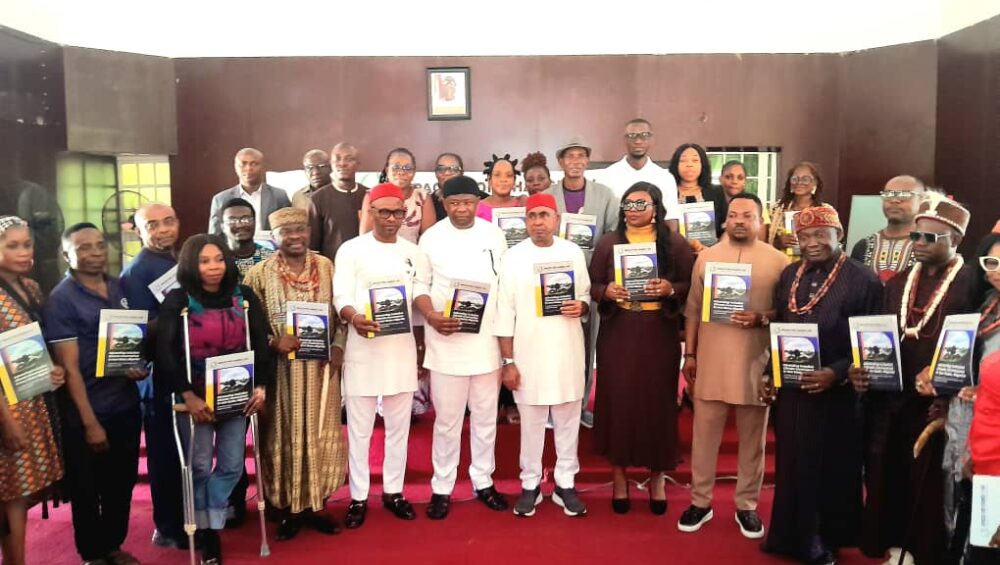By: Harriet Ijeomah
Owerri, Imo State – April 29, 2025Months after launching a historic journey toward climate legislation, Imo State witnessed yet another major milestone today as the civil society organization Space for Change officially unveiled a policy brief titled “Advancing Inclusive Climate Governance in Imo State, Nigeria: Transforming Challenges Into Opportunities”.
The presentation event, held in Owerri, Imo State Nigeria, brought together key stakeholders from government institutions, civil society, academia, traditional institutions, and the private sector. The brief is a result of extensive research and multi-stakeholder engagement processes that began after the inauguration of the Imo State Technical Committee on Climate Change on October 18, 2024, and the first climate policy drafting session conducted on January 21, 2025, in partnership with the Imo State Ministry of Environment.
Imo State is currently among Nigeria’s most vulnerable regions to the impacts of climate change. According to data from the Nigeria Erosion and Watershed Management Project (NEWMAP), the state has over 360 gully erosion sites, making it one of the highest in the country. Combined with increasing incidences of flooding, deforestation, erratic rainfall, and rising temperatures, these environmental challenges are causing widespread damage to agriculture, infrastructure, public health, and the livelihoods of millions.
Rural communities, particularly women and children, are bearing the brunt. In many Local Government Areas such as Ideato North, Isiala Mbano, Orlu, and Oguta, farmers have reported repeated crop failure due to unpredictable rainfall and soil degradation. A 2023 climate vulnerability assessment by the Nigerian Meteorological Agency (NiMet) noted that average rainfall in the state has increased by 15% over the last decade, while dry spells have become more intense, affecting planting cycles.
Representing the Executive Governor of Imo State, Senator Hope Uzodinma, the Commissioner for Power and Electricity, Mr. Nwabueze Oguchienti, commended Space for Change and its partners for the efforts put into producing the document. He acknowledged the severity of climate-related challenges already facing the state. “The impact of climate change is no longer news,” he said. “It is affecting our farmlands. We are battling gully erosions, erratic rainfall, and flooding. These things are destroying livelihoods and threatening food security. Women are mostly affected. The situation is worsening, and the state is vulnerable.”
Mr. Oguchienti further emphasized that the government recognizes the importance of collective action to build resilience, calling on all relevant actors to collaborate in finding solutions. “We need everybody on board—traditional leaders, the private sector, researchers, development partners, and civil society. This is not something the government alone can solve,” he added.
The Commissioner for Environment and Sanitation, Barrister Ejikeme Major Emeneike, described the publication as a strategic partnership between the ministry, Space for Change, the Ford Foundation, and the Institute of Development Studies. In his opening remarks, he reflected on the urgency of action and the value of inclusion. “The presentation of this knowledge resonates deeply with the aspirations of Imo State. It is a call to action. A call to lead the path for climate justice. We must ensure that the voices of vulnerable communities are heard and protected in global climate discourse,” he said.
He spoke further on the wider goal of inclusive environmental governance, noting: “We must release governance in the face of climate change and create a future where every voice is heard, every community is upheld, and every challenge becomes an opportunity for growth. Climate change in Imo is a reality. From flooding to gully erosion and food insecurity, our people are suffering. But these challenges demand leadership that is bold, inclusive, and visionary.”
Victoria Ibezim-Ohaeri, Executive Director of Space for Change, gave an in-depth overview of the policy brief, stating that it was developed through a participatory process that involved identifying the existence and evidence of climate change in Imo State and analyzing its impacts. “What we are presenting today is not just a paper,” she said. “It is part of the policy development process. We looked at the problems, the signs, the evidence. We engaged communities and actors. What we found shows that climate change is real in Imo State.
She took participants through the publication, explaining that it addresses the historical background of climate trends in the state and their consequences, such as intense rainfall, rising temperatures, deforestation, gully erosion, flooding, and poor agricultural yields. These, she said, result in health crises, displacement, and environmental degradation.
She also noted: “Our findings show that if we want to move forward, we must begin to integrate renewable energy, climate-smart agricultural practices, and nature-based solutions into the state’s development agenda. Imo can become a climate-smart state through sustained engagement, collaboration, and inclusion.”
The Chairman of the Imo State House of Assembly Committee on Environment, Hon. Innocent Ikpamezie, speaking on behalf of the Speaker, Hon. Chike Olemgbe, emphasized the need for stronger grassroots engagement. He said, “It is good that we are here talking, but let me tell you: the climate crisis is already affecting the people in the villages. That is where you see the erosion eating up people’s homes. That is where the rainfall is washing away the crops. The local communities are where this discussion is most needed. We need to take this awareness down to the people.”
Throughout the event, it was widely agreed that Imo State’s environmental future depends on the state’s ability to act decisively and inclusively. The policy brief is expected to guide future legislative and administrative decisions aimed at building a sustainable, climate-resilient Imo State.
The event marks another crucial step in the state’s climate policy roadmap, reinforcing the importance of stakeholder participation, strategic partnerships, and local ownership of climate solutions. As Nigeria, and indeed the world, continues to face intensifying climate challenges, stakeholders hope that Imo’s approach can serve as a model for other sub-national entities seeking to localize climate governance.





